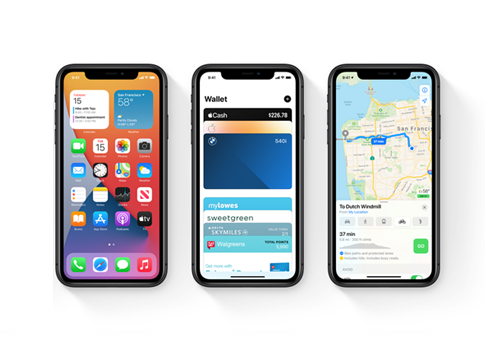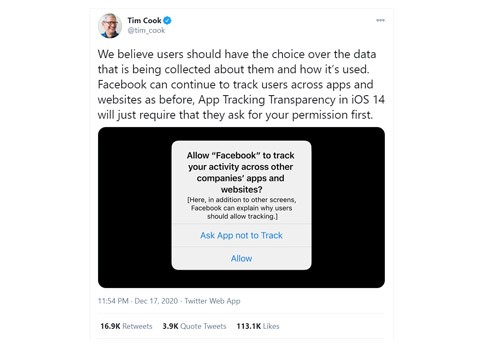In the first of two articles, we discuss the impact of Apple’s iOS 14 on your hotel’s social advertising. See also part 2: ‘iOS 14 – what it means for your hotel’s social advertising attribution‘.

The impending IOS 14 updates from Apple could spell trouble for advertisers across the globe, as enhanced privacy features for users inevitably lead to reduced targeting options for businesses.
The public dispute over Apple’s App Tracking Transparency (ATT) framework has been known for some time, but the extent to which advertisers will be limited has only become clear in recent weeks.
Facebook in particular will be largely affected by the change, with a reduction in trackable conversions, reporting capabilities and audience features. Facebook advertisers in recent weeks may have come across the following message:
Apple has announced changes with iOS 14 that will affect how we receive and process events from tools such as the Facebook SDK and Facebook pixel. In response to these changes, we have replaced the existing account attribution window with a new ad set attribution setting that will default to 7-day click and 1-day view starting on 19 January 2021. While these changes won’t affect ad delivery, the new default attribution setting may result in a decrease in the number of reported conversions.

iOS 14 Impact on Facebook
Included within the IOS 14 update is the App Tracking Transparency framework, which looks to give users more control over their privacy features while using applications. The new update has two main features – making users more aware of the data that an app collects before they install it, and then a permission opt in once the app has been installed. This opt in will also appear on apps installed before the IOS 14 update the first time a user enters the application.
While users had the option to control privacy settings across apps before, this was hidden within the device settings so many users remained unaware of how to change their privacy features. The new update seeks to remedy that, making privacy opt ins much more front and centre for all apps as users will have to expressly accept or deny privacy permissions for every application they wish to use.
This is where Facebook and other social apps are getting frustrated, as in increase in user control over privacy inevitably leads to a reduction in data collection for platforms. This data reduction affects not only the applications own user data, but the user data tracked by any advertisers on the platform.
How iOS 14 Will Affect Facebook & Instagram Ads
There are a number of changes to hotel social media advertising that will come into effect as a result of the IOS 14 update, some as a direct result of the change and others from Facebook’s adaptation to the update.
- Reporting will be less accurate – Any pixel-based conversion actions on your site (such as purchases, add to cart, PDF downloads etc) are more likely to be under reported as any IOS 14 user who has opted out of tracking will be missing from your pixel data.
- Conversion actions will be reduced – Facebook has adapted to the upcoming change by reducing the number of conversion actions that any site can measure from Apple devices. Previously, you had an almost unlimited ability to track any conversion action on your site that you deemed important. Now, that has been reduced to just eight key conversions. While advertisers are still able to choose their own conversion actions, businesses will have to prioritise their most important eight – meaning that many micro-conversions could become a thing of the past for mobile-focused social advertisers.
- Optimisation – With a reduction in data collection, it’s almost inevitable that Facebook’s algorithm will struggle to optimise ad delivery as well as it has done previously. In an attempt to remedy this loss of data, Facebook has introduced “aggregated event measurement” which will use statistical models to estimate actual campaign performance. In a statement on the IOS 14 rollout, Facebook simply claimed that this new statistical model is “designed to help you measure campaign performance in a way that is consistent with consumers’ decisions about their data.” However, no clearer insight into this feature has been given.
- Audience targeting – With fewer people being tracked through the Facebook pixel, it’s likely that custom audiences and retargeting audiences will be reduced in size. This could lead to potential targeting issues and a heavier reliance on Facebook’s interest-based targeting. There will also be the loss of audiences built on conversion actions outside of your hotel’s eight core conversions. For instance, if your hotel decides that restaurant bookers are not enough of a priority to be included within your eight conversion actions, you will lose all data for this audience and be unable to retarget them from Facebook.
- Ad reporting – Alongside a reduction in tracking, Facebook is also reducing your reporting capabilities as they remove their 28 day click and view through attributions and instead replace these with a maximum window of 7 day click and 1 day view through. This will be discussed in more detail in our second post on the impact of iOS 14 on hotel social advertising attribution.
However, it’s important to note that the above changes will only apply to IOS 14 users that opt-out of data tracking. Users on Android or Windows devices will be unaffected by the changes as will those who are happy for their data to be collected.
If you'd like support with your hotel's social advertising, we'd love to chat.








